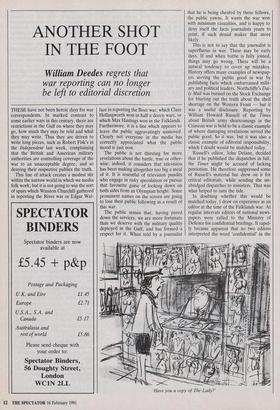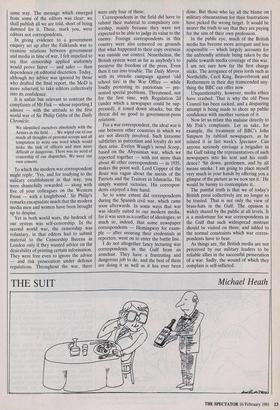ANOTHER SHOT IN THE FOOT
William Deedes regrets that
war reporting can no longer be left to editorial discretion
THESE have not been heroic days for war correspondents. In marked contrast to some earlier wars in this century, there are restrictions in the Gulf on where they may go, how much they may be told and what they may write. Thus they are driven to write long pieces, such as Robert Fisk's in the Independent last week, complaining that the British and American military authorities are controlling coverage of the war to an unacceptable degree, and so denying their respective publics the truth.
This line of attack creates a modest stir within the narrow world in which we media folk work; but it is not going to win the sort of spurs which Winston Churchill gathered 'n reporting the River war or Edgar Wal- lace in reporting the Boer war, which Clare Hollingworth won in half a dozen wars, or which Max Hastings won in the Falklands. Furthermore, it is a line which appears to leave the public aggravatingly unmoved. Clearly not everyone in the media has correctly appreciated what the public mood is just now.
The public is not thirsting for more revelations about the battle, true or other- wise; indeed, it considers that television has been making altogether too big a meal of it. It is resentful of television pundits who engage in risky speculation or pursue that favourite game of looking down on both sides from an Olympian height. Some prominent names on the screen are going to lose their public following as a result of this war.
The public senses that, having pared down the services, we are more fortunate than we deserve with the military quality deployed in the Gulf, and has formed a respect for it. When told by a journalist that he is being cheated by these fellows, the public yawns. It wants the war won with minimum casualties, and is happy to deny itself the facts journalists yearn to print, if such denial makes that more likely.
This is not to say that the journalist is superfluous in war. These may be early days. If and when battle is fully joined, things may go wrong. There will be a natural tendency to cover up mistakes. History offers many examples of newspap- ers serving the public good in war by publishing facts which embarrassed milit- ary and political leaders. Northcliffe's Dai- ly Mail was burned on the Stock Exchange for blurting out the truth about the shell shortage on the Western Front — but it was a useful disclosure. Reporting by William Howard Russell of the Times about British army shortcomings in the Crimean war is held to be a classic example of where damaging revelations served the public good. So it was, but it was also a classic example of editorial responsibility, which I doubt would be matched today.
Russell's editor, John Delane, decided that if he published the dispatches in full, the Times might be accused of lacking patriotism. He therefore suppressed some of Russell's material but drew on it for critical editorials, while sending the un- abridged dispatches to ministers. That was what helped to turn the tide.
In doubting whether this would be matched today, I draw on experience as an editor at the time of the Falklands war. At regular intervals editors of national news- papers were called to the Ministry of Defence for confidential briefings. It rapid- ly became apparent that no two editors interpreted the word 'confidential' in the 'Have you a copy of The Lady?' same way. The message which emerged from some of the editors was clear: we shall publish all we are told, short of being damned for it. These, mark you, were editors not correspondents.
In giving evidence to a government enquiry set up after the Falklands war to examine relations between government and media in time of war, I felt impelled to say that censorship applied uniformly
would prove fairer and safer — than dependence ph editorial discretion. Today, although my advice was ignored by those who drafted the final report, the MoD is more reluctant to rake editors collectively into its confidence.
It is unfair but relevant to contrast the complaints of Mr Fisk— whose reporting I admire — with the attitude to the first world war of Sir Philip Gibbs of the Daily Chronicle: We identified ourselves absolutely with the Armies in the field . . . We wiped out of our minds all thoughts of personal scoops and all temptation to write one word which would make the task of officers and men more difficult or dangerous. There was no need of censorship of our dispatches. We were our own censors.
To which the modern war correspondent might reply; 'Yes, and for toadying to the military establishment in that way, you were shamefully rewarded — along with five of your colleagues on the Western Front — with a knighthood.' Sir Philip's remarks encapsulate much that the modern media men and women have been brought up to despise.
Yet in both world wars, the bedrock of our system was self-censorship. In the second world war, the censorship was voluntary, in that editors had to submit material to the Censorship Bureau in London only if they wanted advice on the desirability of printing certain information. They were free even to ignore the advice — and risk prosecution under defence regulations. Throughout the war, there
were only four of these.
Correspondents in the field did have to submit their material to compulsory cen- sorship, mainly because they were not expected to be able to judge its value to the enemy. Foreign correspondents in this country were also censored on grounds that what happened to their copy overseas was outside our control. Nonetheless, the British system went as far as anybody's to preserve the freedom of the press. Even then it ran into trouble. The Daily Mirror, with its vitriolic campaign against 'old school ties' in the War Office — while loudly protesting its patriotism — pre- sented special problems. Threatened, not for the first time, with Regulation 2d (under which a newspaper could be sup- pressed), it toned down attacks; but the threat did no good to government-press relations.
For a war correspondent, the ideal war is one between other countries in which we are not directly involved. Such tiresome subtleties as patriotism and loyalty do not then arise. Evelyn Waugh's novel Scoop, based on the Abyssinian war, which we reported together — with not more than about 40 other correspondents — in 1935, makes the point well. Lord Copper of the Beast was vague about the merits of the Patriots and the Traitors in Ishmaelia. He simply wanted victories. His correspon- dents enjoyed a free hand.
So to some extent did correspondents during the Spanish civil war, which came soon afterwards. In some ways that war was ideally suited to our modern media, for it was seen as a conflict of ideologies; so much so, indeed, that some newspaper correspondents — Hemingway for exam- ple — after securing their credentials as reporters, went on to enter the battle line.
I do not altogether fancy lecturing war correspondents in the Gulf from an armchair. They have a frustrating and dangerous job to do, and the best of them are doing it as well as it has ever been
done. But those who lay all the blame on military obscurantism for their frustrations have picked the wrong target. It would be nearer the truth to say that they are paying for the sins of their own profession.
In the public eye, much of the British media has become more arrogant and less responsible — which largely accounts for the unfriendly attitude being taken by the public towards media coverage of this war. I am not sure how far the first charge sticks. The arrogance of press lords such as Northcliffe, Cecil King, Beaverbrook and Rothermere in their day transcended any- thing the BBC can offer now.
Unquestionably, however, media ethics have crashed. That is why the old Press Council has been sacked, and a despairing attempt is being made to shore up public confidence with another version of it.
Now let us relate this malaise directly to Mr Fisk's complaints. Let us take, for example, the treatment of BBC's John Simpson by tabloid newspapers, as he related it in last week's Spectator. Can anyone seriously envisage a brigadier in the Gulf taking the representatives of such newspapers into his tent and his confi- dence? 'Sit down, gentlemen, and by all means smoke. I am going to place myself very much in your hands by offering you a glimpse of the picture as we now see it.' He would be barmy to contemplate it.
The painful truth is that we of today's British press collectively are no longer to be trusted. That is not only the view of brass-hats in the Gulf. The opinion is widely shared by the public at all levels. It is a misfortune for war correspondents in the Gulf that such widespread mistrust should be visited on them; and added to the normal constraints which war corres- pondents have to bear.
As things are, the British media are not perceived by our military leaders to be reliable allies in the successful prosecution of a war. Sadly, the wound of which they complain is self-inflicted.



















































 Previous page
Previous page